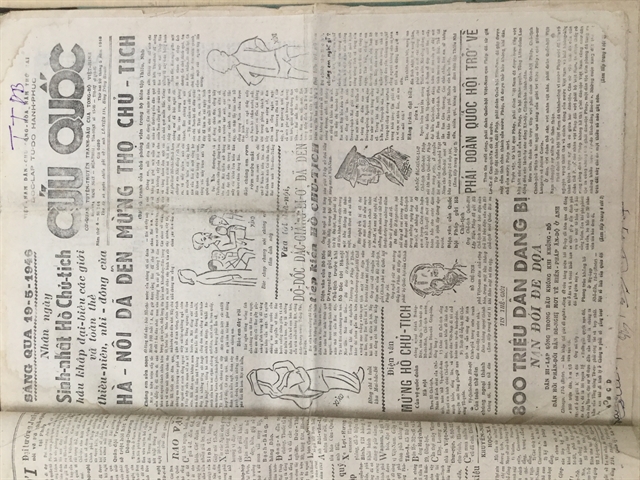
CLEVER RUSE: The cover page of Cứu quốc newspaper on May 20, 1946 ran a report congratulating President Hồ Chí Minh on his birthday. All Photos by Lady Borton
by Lady Borton
On May 19, Việt Nam celebrates President Hồ Chí Minh's birthday.
Yet, traditionally, Vietnamese do not celebrate birthdays (except everyone’s birthday at Tết Lunar New Year). When I lived in the south during the Vietnam War, our impoverished patients from the countryside did not know their birthdates in the Western calendar.
When I worked as a health administrator for Vietnamese boat people on Malaysia's Pulau Bidong, most of our patients did not know their Western birthdates. In all these cases, Vietnamese responded to queries with the lunar year of their birth.
Official records during Hồ Chí Minh’s generation were spotty. Nevertheless, Hồ Chí Minh’s birthday appears as May 19, 1890, in the first volume of the ten-volume chronology of President Hồ's life. This chronology, which is usually rigorous about sources, lists no reference for that entry.

BIRTHDAY THANKS: A Public Thank-You letter by President Hồ Chí Minh to all who wished him well.
No subsequent yearly entries for May 19 in the chronology mention Hồ Chí Minh’s birthday, until May 19, 1946.
Why does the chronology not list a similar entry for, say May 19, 1941, the final day of the meeting that established the Việt Minh? Why is the second entry in the chronology only five years later, on May 19, 1946?
Here is the story:
Hồ Chí Minh had lived in France. He knew French customs, and diplomatic protocol.
In mid-May 1946, French Commissioner General Admiral Thierry d’Argenlieu, the highest-level French representative in Indochina, was due to arrive in Hà Nội while Provisional President Hồ was still trying to facilitate the Democratic Republic of Việt Nam (DRVN) full membership in the French Union and while Admiral d'Argenlieu was excluding the DRVN from discussions about the Southern Region.
Protocol would require that Provisional President Hồ Chí Minh go out to meet the admiral upon his arrival. Instead, Hồ Chí Minh compelled the French leader to meet the president of newly independent Việt Nam (the DRVN) at the new president’s Presidential Palace.
Hồ Chí Minh and his staff set about upstaging the French commissioner.
The day of Admiral d’Argenlieu’s arrival, May 18, Cứu Quốc (Save the Nation), the newspaper of the People’s Associations, ran a story headlined, “Elder Hồ Chi Minh with the Vietnamese People”.
For the first time and with hoopla, the newspaper announced President Hồ’s birthdate and age (56), which may or may not have been accurate. This announcement forced Admiral d’Argenlieu to follow French custom. Upon arriving in Hà Nội, he had to visit President Hồ. The French leader arrived and bowed, saying, “Tomorrow is the President’s birthday. Please let me wish the President longevity.”
Hồ Chí Minh then upstaged French Commissioner d’Argenlieu again.
The next day, he usurped the Western press.
The presidential staff and People’s Associations organized representatives from citizens' groups to visit Elder Hồ and congratulate him on his birthday (this strange, new custom!).
Of course, the kids were first, all the various levels of kids, including war orphans. And then the youths, the adults, elders, farmers, labourers, traders, and, of course, the soldiers, the National Assembly, the political parties, the government leaders, and the religious leaders.
Cứu Quốc's coverage printed on May 20 took up the newspaper's first page.
Here was great public entertainment for a man who was modest. But Hồ Chí Minh was not above staging a clever ruse to introduce Admiral d'Argenlieu, his French nemesis, and the French press and the reporters from other nations to the Vietnamese celebrants who visited him and formed his growing base of people’s warriors willing to sacrifice for Việt Nam's independence.
Although surely not Hồ Chí Minh’s intention, he also added birthdays to Vietnamese culture.
On May 25, 1946, President Hồ thanked those who had honoured him on his birthday. The list shows the depth and width of the organizers’ efforts to upstage French Admiral d’Argenlieu.

PUBLICITY WAR: The cover page of Cứu quốc newspaper banner reads, Việt Nam Democratic Republic, Second year. The front page story ran congratulation messages from people's of all walks of life, alongside a story 'How do the people of Việt Nam abolish the 'illiteracy enemy'?'
Letter of Thanks
I respectfully thank:
The National Assembly; the Government; the political parties; the People’s Associations;
compatriots in the Northern, Central, and Southern Regions; Catholics, Buddhists, and Protestants; the youths; and the children.
Thank you to the Chinese, French, American, and British friends who have shown their affection for me in wishing me a Happy Birthday.
On this occasion, I promise my compatriots that from today onward, just as from today into the past, I will exert all my strength in the struggle to preserve the autonomy of our nation, the right to freedom for our people, and the right to democracy for our compatriots.
I promise friends in other nations that I will use my spirit and strength to help establish friendly relationships with all nationalities.
Published in Cứu Quốc (Save the Nation), the newspaper of the People’s Associations, No 247, May 23, 1946
* From VIỆT NAM'S PEOPLE'S WAR: Điện Biên Phủ and Beyond, forthcoming from Hà Nội's Nxb Thế Giới (World Publishers).
OVietnam